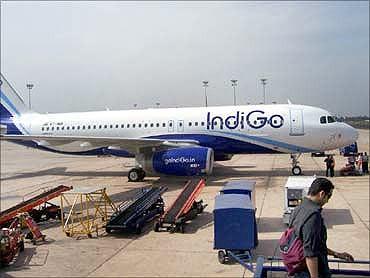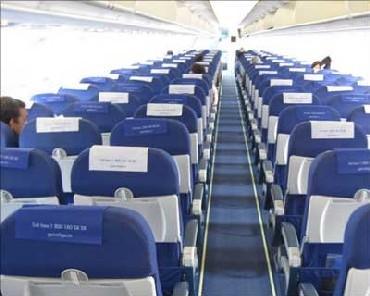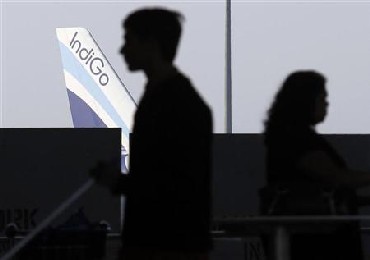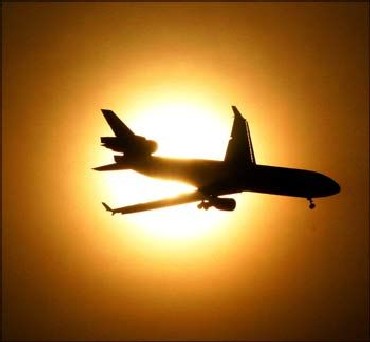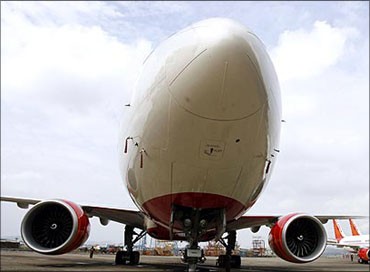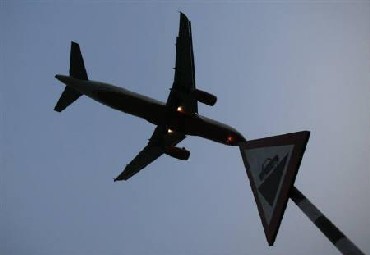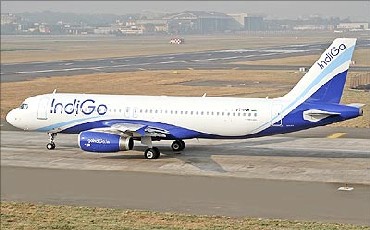 | « Back to article | Print this article |
IndiGo ready to make its international debut
In January this year, it surprised the aviation world by placing an audacious $15.6-billion order on Airbus for 180 new A-320neo upgraded aircraft, to be delivered from 2015. It was touted as one of the largest aircraft deals globally.
But IndiGo - already the number-three airline in the domestic market, with a market share of 19.7 per cent, just a whisker away from Kingfisher Airlines (20 per cent) - is not doing anything audacious as it makes its international debut.
This time it will be a quiet and low-profile entry.
Come August and the airline would start with a nine-aircraft fleet to fly to destinations in Southeast Asia and West Asia.
Initially, it will operate from just two cities, Delhi and Mumbai, but it could be followed by Kolkata.
Click NEXT to read more...
IndiGo ready to make its international debut
Aditya Ghosh, the low-profile CEO of the airline, says his airline would fly about 20 per cent of its seating capacity overseas - nine aircraft out of a fleet of 50 - for its international foray.
"We hope to launch by August and start our bookings in June" is all that Ghosh is ready to say.
But IndiGo has a pretty clear idea about where it will be flying. Permissions have already been taken for this.
So, its first few flights will connect Delhi directly to Singapore, Bangkok and Dubai.
It is still pushing for slots at the Mumbai airport (which are difficult to get), so that it can connect directly to Singapore, Dubai and Muscat too.
IndiGo executives say it will fly these destinations in the morning from India and come back in the evening using the same aircraft. It will also fly neighbouring country capitals like Colombo and Kathmandu.
Click NEXT to read more...
IndiGo ready to make its international debut
For the time being, it is concentrating on getting the necessary permissions needed to start booking for international destinations on the net by the beginning of June so that customers could pick up tickets in advance.
It is also working out holiday packages for leisure travellers where it can pass on to the passengers the benefit of volume discounts on large bookings.
The airline, of course, believes that international travel will provide it better margins, given that it is already making reasonable profits that they do not divulge.
Those close to the airline say the logic is simple: A Delhi-Chennai return average fare on a low-cost carrier is around Rs 10,000. Yet, for a similar distance from Mumbai to Dubai, the airline could charge around Rs 14,000-15,000 on an LCC.
"Apart from the higher yield on tariff, we save on fuel costs. ATF is cheaper for international flights and, in some cases, you burn less oil per kilometer when the cruise time is longer," says an IndiGo executive.
Click NEXT to read more...
IndiGo ready to make its international debut
Surely, ATF prices for domestic flights are about 60-80 per cent more expensive than what is available in cities like Bangkok, Singapore or Dubai. Also, differential taxes have ensured that ATF fuel in the domestic market is also around 23 per cent cheaper for international flights.
"Considering that ATF is 40-50 per cent of our cost, this comes as a major saving that goes straight to the bottom lines," says an industry insider.
Margins and profitability are better but so is competition and IndiGo also knows this.
On the one hand, Air Asia already flies seven destinations in the country - Bangalore, Chennai, Delhi, Kochi, Kolkata, Mumbai and Tiruchirapalli - connecting these to both Kuala Lumpur and Bangkok
It already offers rates at Rs 11,000-12,000 on an average for a return fare - much cheaper than full-service carriers, whose average rates are between Rs 18,000 and Rs 22,000.
Click NEXT to read more...
IndiGo ready to make its international debut
Thai AirAsia CEO Tassapon Bijleveld says: "Around 45 per cent of travellers from India are leisure travellers. This is why we are looking at direct flights to Phuket from India. The flight may be from Kolkata."
He is also looking at new destinations like Amritsar and Pune and Varanasi. More important, India is a key market the airline is planning to expand in 20 new destinations, of which six-seven would be in India.
Even home-grown LCC SpiceJet is planning its second phase of expansion in August-September to the same markets that IndiGo is targeting.
"We plan to start flights to South Asian and West Asian countries by August or September, as some of our Boeing aircraft will be delivered during that period. We have applied for permission from the civil aviation ministry for a lot of destinations in these two regions and are awaiting permissions," said CEO Neil Mills.
Click NEXT to read more...
IndiGo ready to make its international debut
Moreover, Air India's entire revival plan is based on putting in more capacity and more share in these two key markets. But the good news is that Ghosh believes these markets will grow for LCCs by at least 20 per cent a year and there is space for everyone.
Industry estimates show that 60-65 per cent of the market for international travellers will come from these two markets. And West Asia itself is expected to see passenger growth going up from around 16 million a year at present to over 22 million in 2014.
Even IATA's projections suggest both Southeast Asia and West Asia are key markets, growing by 8.5-10 per cent CAGR, much higher than the overall international market growth of around 8 per cent between 2000 and 2014.
The other good piece of news is that the government, to protect Air India, has already made the fresh round of bilateral talks for more capacity to foreign airlines very difficult.
Click NEXT to read more...
IndiGo ready to make its international debut
According to Air India's assessment, if that happens, the bilateral of foreign carriers in West Asia will be exhausted by 2013, while that of Southeast Asia would be over by 2012.
This will ensure that they cannot grow further. But about 40 per cent of the Indian capacity is still unutilsed.
So Air India may pick some of it if it gets new aircraft, but LCCs like IndiGO, which are getting new aircraft, could piggybank on this advantage.
Besdies these, many new international LCC challengers have not yet been able to make any dent in the Indian market.
Click NEXT to read more...
IndiGo ready to make its international debut
For instance, Fly Dubai has connectivity to only Hyderabad and Lucknow through a thrice-a-week flight, even as it has aggressive expansion plans.
Singapore Airlines, which recently announced a low-cost service, is directed more to take on Air Asia on its long-haul service business, which is growing very quickly, rather than in short haul markets like India, industry expert say.
IndiGo has been a quiet performer in the domestic skies, growing its market share steadily and acquiring new aircraft according to its schedule, in spite of the economic slowdown a few years ago.
The question is whether it will be able to repeat the same magic in its overseas foray.
